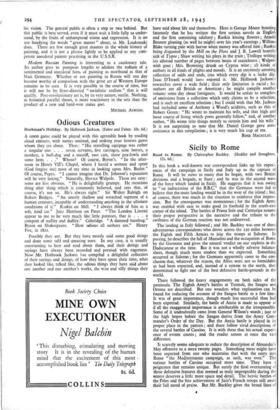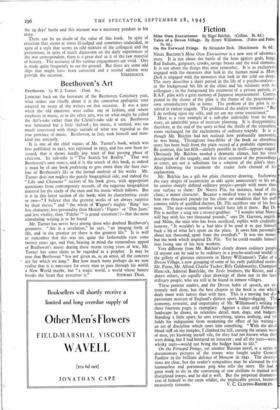Sicily to Rome
IN this book a well-known war correspondent links up his experi- ences of the campaign in Sicily and Italy up to the capture of Rome. It will be news to many that he began, with two British divisions and a brigade, at Suez ; and he was in the second wave of the force which landed in Sicily. He suggests that it was owing to " an indiscretion of the B.B.C." that the Germans were led to believe that the main landing would be in the west of the island ; but, of course, there was much in the situation to reinforce that impres- sion. But the consequence was momentous ; for the Eighth Army was enabled with ease to make good its foothold in the south-east corner of the island. The battles of Prima Sole and Centuripe assume their proper perspective in the narrative and the tribute to the swiftness of the German reaction was not undeserved.
The landing in Italy followed ; and Mr. Buckley was one of those adventurous correspondents who drove across the 120 miles between the Eighth and Fifth Armies to join the troops at Salerno. In passing, he describes the fall of Mussolini and the occupation of Rome by the Germans and gives the natural verdict on our exploits in the Dodecanese at the time. But it was not a wholly adverse balance- sheet, though much more modest than we expected. Something occurred at Salerno ; for the Germans apparently came to the con- clusion that, whatever the reason, the Allies were not so formidable as had been expected, and, instead of a retreat to the north, they determined to fight one of the best defensive battle-grounds in the world.
There followed the heavy engagements on both sides of the peninsula. The Eighth Army's battles at Termoli, the Sangro and Ortona are described. But one wonders what explanation can be found for reducing the account of the Sangro battle to a few lines. It was of great importance, though much less successful than had been expected. Similarly, the battle of Anzio is made to appear as if all the exaggerated importance is attributable to the irresponsible. Some of it undoubtedly came from General Wilson's words ; just as the high hopes before the Sangro derive from the Army Com- mander's Order of the Day. But the Anzio battle is placed in its proper place in the pattern ; and there follow vivid descriptions of the several battles of Cassino. It is with these that his actual experi- ence of events ceases ; and the reader senses at once the vast difference.
It scarcely seems adequate to reduce the description of Alexander's May offensive to a mere twenty pages. Something more might have been expected from one who maintains that with the entry into Rome " the Mediterranean campaign, as such, was over." The various battles of Cassino occupied more time. They have a poignance that remains unique. But surely the final overrunning of these defensive features that seemed so truly impregnable during the winter deserves a little more space and detail. The heroic battles of the Poles and the fine achievement of Juin's French troops still await their full meed of praise. But Mr. Buckley gives the broad lines of
the 24 days' battle and this account was a necessary pendant to his story.
There can be no doubt of the value of this book. In spite of criticism that seems at times ill-judged and sometimes undecided, in spite of a style that seems an odd mixture of the colloquial and the pretentious, in spite of much digression on the daily experiences of the war correspondent, there is a great deal in it of the raw material of history. The accounts of the various engagements are vivid. One is made quite frequently to see the ground. But there are some odd slips that might have been corrected and a second edition may



























 Previous page
Previous page